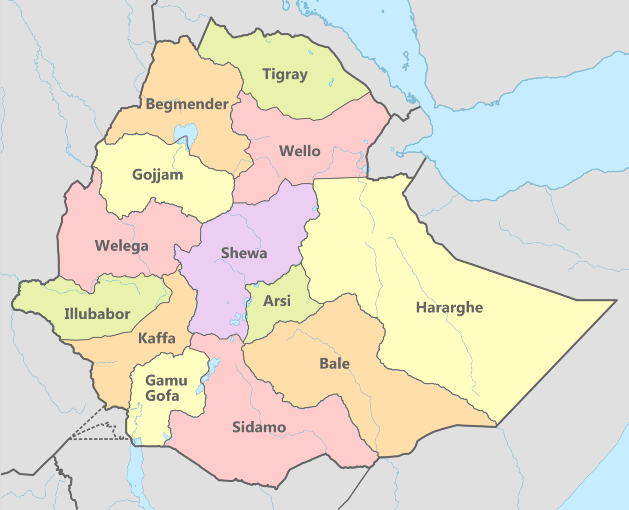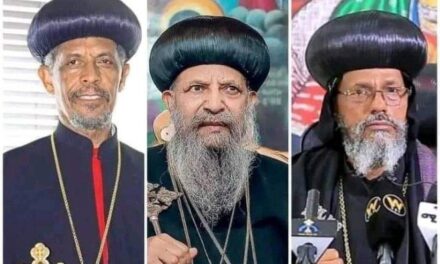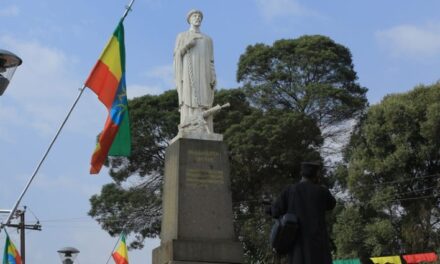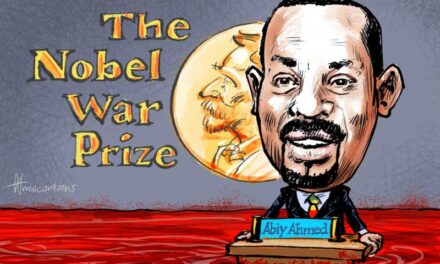By: Kebere Assefa (A practicing attorney and member of the District of Columbia Bar since 1992, Assefa has law degrees from Addis Ababa University, Yale University, and University of Chicago)
A Featured image is a reminder of what Ethiopia’s domestic boundaries looked like.
With liberation of Mekelle, capital of Tigray regional state, from the hands of the rebel forces, what the Ethiopian government had declared ‘a law enforcement operation’ has finally come to an end. Yet the closing of every crisis prompts a reflection as to what caused it in the first place. This crisis is no different.
We Ethiopians need to reflect deeply as to what brought on to us this crisis and what to put in place to avoid similar crisis in the future. Doing so prompts us to examine the journey that those who stood for the ideals of political change have taken over the last half a century or so.
Here again, it is not still late to think and analyze historical debates with regards to the “Question of Nationalities” and how we tried to address it. The current constitution has by and large been informed by those who were driven by the “nationality question” regardless of some severe misconceptions in the ways it informed the debate.
In that respect, many with some plausible reasons, trace our current predicament to the current constitution of Ethiopia. Mainly, they blame a badly written constitution that has determined and given some iron-clad meaning to regional boundaries, allowed the formation of ethnic based organizations, and influenced the political discourse that followed.
Those who stood together demanding for political change decades ago now appear to stand on different sides of the divide when it comes to the question of should happen to the constitution.
One major debate also remains that either the diagnosis of the country’s problems or the prescription to those problems or both are wrong.
In light of our experiences in the past decades and the recent debacle in Tigray, what is our assessment? Is it not time to revisit the whole approach, and could there be a better time to revisit this issue than this?
A candid assessment of what we have achieved before and after the implementation of ethnicity as the main organizing principle demands that we put in place some parameters for our assessment to begin with. Fraternal relations amongst members of the various linguistic groups constituting the nation is one among many. Freedom of movement for labor and capital in the state and respect for the rights of citizens wherever they reside could be another.
Assessing the results of employing ethnicity as the main organization principle also points to the negative rather than the positive. Interethnic relations are at their lowest today than at all other times in our history. Individuals from different ethnic groups who commonly used to stand for a shared cause now seem a rarity and an anachronism.
How is it that we were able to make this reactionary somersault from the universal to the primordial? How did we appropriate identity politics, that was hardly known prior to the 1960’s without critically examining its implications? It is time to find answers for such questions; as the ethno-centric political phenomenon has endangered our lives and livelihoods. Simply put, our very existence as members of a polity is in danger as it has resulted in more harm than good.
Certainly, many recognize that there is a resistance in most of the developed countries to organize society along ethnic lines. Why should we all in the developing countries allow our countries to be experimented on the same beaten path? I advise that we should not.
Just look at what the ethnically arranged federal system caused the country so much pain that we all could continue to reel from it for some time. The now defunct TPLF leadership had incorporated large swaths of land that had traditionally belonged to the Amhara and incorporated it in what it called Tigray Region. In the current conflict initiated by the TPLF these lands have been liberated by federal troops with the assistance of the Amhara special force and militia. Following the defeat of the TPLF, are these lands going to revert back to Tigray Region or be part of the Amhara Region? If the central government holds that these lands be part of Tigray Region, it is feared that the alliance between the federal government and the Amhara Region, the Amhara special force and militia, and most importantly the government’s relations with the Amhara people at large might be impacted. If it is decided to the contrary, inhabitants of Tigray will consider that they have been dispossessed of territories that belonged to them given the fact that it was in their possession for the past three decades, at least.
I suggest that the only solution that will avoid a “victor” or “vanquished” mentality is to do away with the very usage of ethnicity as an organizing principle and assert that citizens wherever they find themselves in whatever administrative subdivision will have the equal protection of their civil rights, and their political rights with very few rational limitations such as duration of residency. Hence, a revising to the current federal system is very essential.
A second thorny issue that will arise following the end of this conflict is what our relationship with Eritrea ought to be including the border issue. It was the TPLF leadership that did all it could to realize the independence of Eritrea. Tens of thousands of Tigrayans had lost their lives along Eritrean combatants to achieve the same. Secondly, following the capture of TPLF’s state power in Addis Ababa, it had given its blessing to the independence of Eritrea in complete disregard to the interests of majority of Ethiopians, particularly its right of access to the sea.
Thanks to the TPLF, Ethiopia remains the biggest country in the world with no access to the sea with all its attendant problems. At the conclusion of the Ethiopia-Eritrean border conflict that erupted a few years after Eritrea’s independence, it was the TPLF leadership that made Ethiopia collect defeat from the jaw of victory having lost tens of thousands of its sons and daughter; of course, it lost after it submitted itself to arbitration following its victory on the battle field, it was the TPLF leadership that brought about victory to the Eritrean leadership, victory that it had failed to achieve on the battle field.
Thereafter, it is the TPLF leadership that refused the implementation of the arbitral award in clear violation of the obligation it had entered into while submitting itself to arbitration in the first place. This was the reason why Ethiopia was forced to amass a huge force along the Ethiopia-Eritrean border for the past twenty years. It was such a stalemate that the Ethiopian Northern Command was guarding for the past two decades.
Nonetheless, it is important that the Ethiopian government should abide by the arbitral award that the TPLF leadership had acceded to and move on to better relations with Eritrea.
The overtures that the Eritrean regime has made to the regime led by PM Abiy Ahmed appears to indicate that Eritrea has every reason to have closer relations with Ethiopia. Eritrea’s conduct in the current conflict between the Ethiopian government and the TPLF leadership suffices that as well. However, for such fraternal and good neighborly relations to continue, however, it is important that the government of Ethiopia also ensures that the territorial dispute with Eritrea is settled and that the two countries start to work on shaping their new path to economic and political cooperation afresh.
In sum, for Ethiopia to be at peace and prosper and for Ethiopians to co-exist in peace and harmony, a closer look at the current constitution, attempt to understand the perennial challenges or questions concerning the citizenry of the country and an effort to address the Eritrea’s territorial demand for once and for all is important.
(The views represented in the opinion piece do not necessarily represent that of East-Africanist’s)





